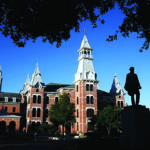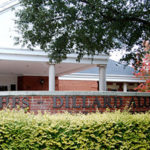After failing to reach a settlement with Baylor University, the Baylor Alumni Association filed a counterclaim asserting the school breached its license and recognition agreements and its promise to provide the alumni organization a building.
The claim seeks a judgment compelling Baylor to perform its obligations under the agreements and preventing the university from operating its Baylor Alumni Network.
In June, the university filed suit against the BAA, seeking a judgment to prevent it from representing itself as the school’s official alumni association and compelling the organization to fulfill its charitable purpose by limiting itself to providing financial aid to Baylor students.
 BAA President Keith Starr “The Baylor Alumni Association and Baylor University spent the better part of the past month trying to resolve our legal dispute,” BAA President Keith Starr said.
BAA President Keith Starr “The Baylor Alumni Association and Baylor University spent the better part of the past month trying to resolve our legal dispute,” BAA President Keith Starr said.
Baylor regents, acting through their attorneys, gave the alumni association until Sept. 6 to approve their latest settlement offer, said Starr, no relation to Baylor President Ken Starr. The association insisted it needed more time to adopt revised bylaws, a process that requires approval by the organization’s board of directors and two-thirds approval by its members after posting a meeting notice published in the Baylor Line magazine.
“At the end of the day, our efforts at peace failed, and the timetable insisted on by the regents was unworkable,” Keith Starr said.
So, the association moved forward with its legal defense and filed its counterclaims Aug. 6 in McLennan County’s 74th State District Court.
Actions ‘disappointing,’ Baylor spokesperson says
Baylor University spokesperson Lori Fogleman expressed the school’s disappointment in that action.
Sign up for our weekly edition and get all our headlines in your inbox on Thursdays
“Over the course of the last two years, Baylor’s administration and board of regents have proactively engaged the alumni association in negotiations. Our most recent discussions were with yet another group of leaders appointed by the association for this purpose. Regrettably, our attempts at resolution have been unsuccessful,” Fogleman said.
“Sadly, the association appears to be unable to chart for itself or to otherwise approve a productive course forward in support of Baylor University and its students. The association’s actions today are disappointing to us all.”
 Last September, members of the alumni association voted 830 to 669 to approve an agreement that would have disbanded the association, turned over all alumni activities to Baylor University and created the Baylor Line Corporation as a separate entity. However, the measure failed because it required a two-thirds vote. The university subsequently terminated its licensing agreement that allowed the alumni association to use the Baylor name and its registered trademarks.
Last September, members of the alumni association voted 830 to 669 to approve an agreement that would have disbanded the association, turned over all alumni activities to Baylor University and created the Baylor Line Corporation as a separate entity. However, the measure failed because it required a two-thirds vote. The university subsequently terminated its licensing agreement that allowed the alumni association to use the Baylor name and its registered trademarks.
Prior to that September meeting, the university demolished the Hughes-Dillard Alumni Center—the alumni association’s on-campus home since 1978—to make way for a plaza leading to a pedestrian bridge connecting the main campus to the new Baylor football stadium. The university provided the alumni association office space in Clifton Robinson Tower until early December, when the group was forced to relocate to an off-campus location in Waco.
In May, the alumni association published an issue of the Baylor Line. It featured a 12,000-word cover article that described the BAA’s perspective on the 12-year dispute between the association and the university’s board of regents and administration.
University filed suit in June
In June, the university filed suit against the BAA, alleging the group no longer has rights to its name and licensed marks.
The alumni association in its counterclaim asserts Baylor violated its agreements with the BAA and created confusion among current and former students through the creation and promotion of its own Baylor Alumni Network.
“The BAA’s efforts to support Baylor continued despite Baylor’s campaign to take over the alumni functions that were the province of the BAA, until Baylor made performance of some functions impossible. Accordingly, the BAA fulfilled its role as Baylor’s general alumni organization as long as Baylor did not wrongly keep it from doing so,” the counterclaim states.
“Over recent years, the relationship between the BAA and the university cherished by its members has soured. Baylor’s administration and board of regents, determined to silence the BAA’s independent voice and to seize control of alumni relations and fund-raising, embarked on a course toward the destruction of the independent BAA and the usurpation of its functions by the university.
“Baylor’s filing of this suit was the culmination of the effort to destroy the BAA.”














We seek to connect God’s story and God’s people around the world. To learn more about God’s story, click here.
Send comments and feedback to Eric Black, our editor. For comments to be published, please specify “letter to the editor.” Maximum length for publication is 300 words.